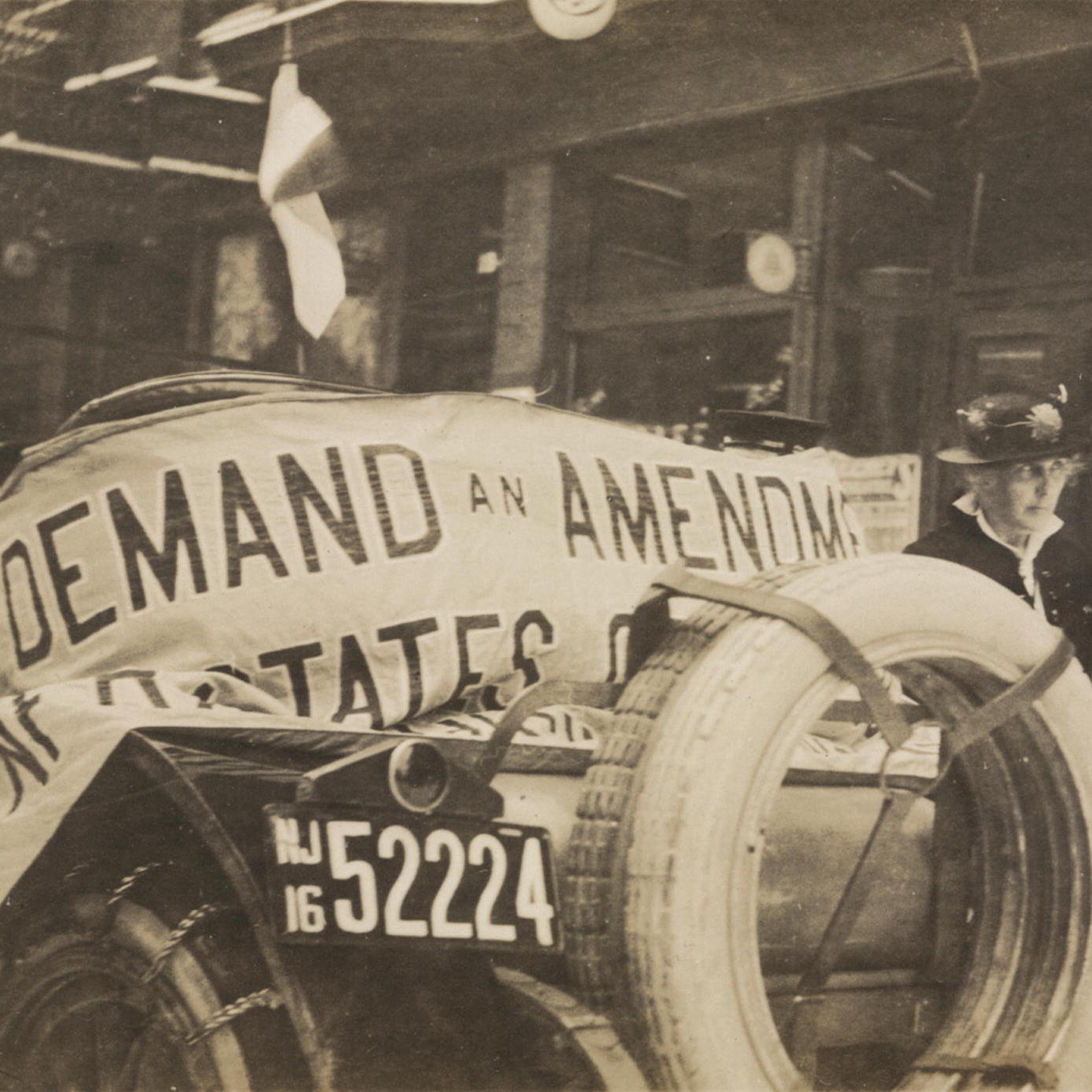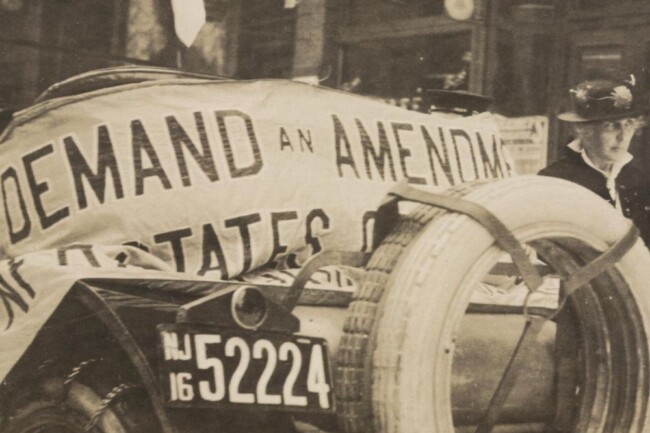As we near a presidential election, reminders, messages, and encouragement to get out and vote make its way into every conversation and crevice of social media and the Internet — for good reason! But imagine this scenario: over 100 years ago, women weren’t allowed to hit the polls because it was illegal for females to vote in any capacity. This was the insane reality that women in the United State faced prior to the passing of women’s suffrage in 1920 – which took place 100 years ago on August 18, 2020. Here’s a bit of history around the movement, specifically in New Jersey.

(Photo Credit: Library of Congress)
New Jersey women have a unique history with the women’s suffrage movement. Under the first New Jersey Constitution, which was created in 1776, prior to the signing of the United States Constitution in 1787, women were allowed to vote. In 1807, this was amended to only “free, white males,” and continued in 1844 a newly written New Jersey Constitution revoked voting and property rights from females. This denial of rights previously granted lit a hotter fire in New Jersey suffragettes, particularly.
After learning more about the organizations they founded, tactics they implemented, stories of their general commitment, and for some, commitment to becoming elected officials, one point becomes quite clear — Jersey girls know how to make things happen.
A Tiresome Timeline
Before we jump into the details, here’s a quick overview of the road to the right to vote.
1776: New Jersey constitution allows women to vote, under certain conditions.
1790: New Jersey passes the “Acts of the Fifteenth General Assembly” which distinguishes voters as both “he” and “she.”
1797: Black women and white women in New Jersey were voting in the state if they met residency and property requirements. More info here.
1800: According to Washington Post, “All inhabitants [in New Jersey] who are worth at least 50 pounds and have lived in New Jersey for a year, “they” shall have the right to vote,” which created an ‘accidental loophole’ for women to vote.
1807: New Jersey’s Constitution amended voting laws to limit voting to “free, white males” per NPS.gov.
1844: A new, second New Jersey constitution limits voting to “free, white males,” as well.
1848: The first-ever women’s rights convention is held in the United States in Seneca Falls, New York at a small chapel with ~200 women. The event was organized by Elizabeth Cady Stanton and Lucretia Mott, who had met previously at an anti-slavery convention in London.
1857: A woman named Lucy Stone makes a move that shakes history for the better – she refuses to pay her property taxes on a home she purchased in Orange, NJ, claiming “taxation without representation.” She felt it was against the principles of America to expect women to pay taxes while denying them voting and property rights.
1867: Antoinette Brown Blackwell of Elizabeth, NJ and Lucy Stone create the New Jersey Woman Suffrage Association (NJWSA) and hold the organization’s first convention.
1868: This is a pivotal year of petition and protest for women’s voting rights, specifically for the women of New Jersey. The eventful year includes:
-
- New Jersey women officially petition the state legislature for voting and property rights. According to a report on the hearings by the Paterson Daily Press, the New Jersey Senate is said to have actually mocked the suffrage position submitted by the NJWSA.
- Lucy Stone publishes a letter titled Reasons Why the Women of New Jersey Should Vote.
- Soon-to-become suffragettes Elizabeth Cady Stanton and Susan B. Anthony both attend a NJWSA meeting in Vineland, NJ.
- Portia Gage tries to vote in a municipal election in Vineland, NJ, but fails.
Read more: Mayor Bhalla Introduces 2020 Hoboken Budget Proposal, Council Members Respond
1869: Black men gain the right to vote via the ratification of the 15th Amendment, prompting suffragettes to fight harder for women’s voting rights on both the state and national levels. The American Woman Suffrage Association (AWSA) is founded by Lucy Stone and the National Woman Suffrage Association (NWSA).
1873: Women in New Jersey are eligible to serve as school trustees, but are not given voting rights on school elections and matters.
1880: Elizabeth Cady Stanton attempts to vote in Tenafly, NJ.
1884: Once again, as they did in 1868, New Jersey women petition the state legislature for full voting rights. It is declined.
1887: Women gain the right to vote in school elections in New Jersey.
1894: A Supreme Court decision rules that it is unconstitutional for women to vote in school elections, superseding the New Jersey decision made in 1887.
1897: School election voting rights for women is put to a national vote, but is defeated.
1910: Florence Peshine Eagleton is the first woman to serve as a trustee of Rutgers University.
1912: A resolution for the passing of women’s suffrage is introduced in the New Jersey Senate. The NJ courts see through a case (Carpenter v. Cornish* arguing that it was unconstitutional for the second New Jersey Constitution (written in 1844) to take away women’s voting rights. The courts do not agree.
1913: Politicians in both the Republican and Democratic parties publicly endorse women’s suffrage and hold meetings with then-President Woodrow Wilson.
1914: NJ native Grace Baxter Fenderson becomes a founder of the NAACP, which joins the fight for women’s suffrage.
1915: President Woodrow Wilson shares his support of suffrage for “private citizens” two weeks before the women’s suffrage decision was being put to a vote. The NJ referendum (i.e. public election on a political question that results in a direct decision) to ratify the amendment denying women the right to vote was defeated. NJWSA membership reaches 50,000 women.
1915: Reverend Florence Spearing Randolph founded the New Jersey chapter of the National Federation of Colored Women’s Clubs. She presided over its first convention, consisting of over 30 clubs from across the state, held in Englewood, NJ.
1917: The National Women’s Party creates a chapter in New Jersey, led by Alison Hopkins.
1918: New Jersey women are among many arrested at mass protests in Washington DC. The NJWSA becomes an organization of 120,000 women strong after smaller organizations decided to merge with them or become fierce allies.
See more: Latest Jersey City + Hoboken COVID-19 Updates
1919: Mayor Frank Hague of Jersey City begins consulting the New Jersey State Suffrage Association as the time was now for them to build and grow upon their already strong momentum.
1920: The 19th Amendment is passed in the United States — meaning the suffrage amendment is ratified in New Jersey, making it the 29th state to allow women to vote. Voting becomes legal for women across the United States of America. But, there was still much work to be done. Read an article here on the continued history of women’s voting rights, specifically Black women of color, here.
Under the passing of the 19th Amendment, Black women should be able to vote but were not always able to in actuality. They were often wrongly told by elected officials that they were in the wrong voting place, didn’t possess proper literary skills required to vote, or filled out their application incorrectly, according to History.com.
1921: Margaret Laird and Jennie Van Ness became the inaugural women to earn an elected position in the New Jersey Assembly.
1925: Rebecca Estelle Bourgeois Winston of Estell Manor is elected New Jersey’s first female mayor.
1965: The Voting Rights Act of 1965 was passed, overcoming legal barriers at both the local and state levels that prevented People of Color from voting.
This article highlights the culmination of this law passing, which happened right after the march from Selma to Montgomery and MLK’s famous speech.
Suffragette Strategies
Women across the nation, and particularly in New Jersey, spent years devising different strategies and tactics to help gain momentum and influence both politicians and individuals to join in on their cause. There were 3 main ways they were able to work and gather support effectively:
Meetings and Publications
New Jersey women turned to lectures, meetings, and conventions to keep themselves informed and effective as a group. As the timeline shows, varying organizations were formed to ensure the fight for suffrage was powerful and continuous. In the 1910s, a Hudson County newspaper began a recurring column titled “Women’s Suffrage Forum” that shared information about local women’s suffrage events and news. This was the primary way that female residents of Hudson County could find out whether individual states voted to allow female residents of their respective states to vote.
Fundraisers
In order to raise money to support the work of suffragists, women held concerts, performances, baseball games and automobile parades. It helped that much of these events sparked the interest of male voters – New Jersey women were thinking strategically.
Publicity Stunts
In New Jersey, it was common for women to attempt to vote (even though it was illegal) as a protest for women’s suffrage. Women would often bring signs and friends to support their performance act. One famous publicity stunt that occurred in 1914-1915 was known as the “passing of the suffrage torch” and pulled off by women from New Jersey, New York, and Pennsylvania. The stunt involved a wooden-carved, bronze-plated “Torch of Liberty” passing from town-to-town and used as a campaigning tool to drive conversation and demonstration for women’s suffrage. The torch made its way to the Hudson River in 1915 and passed from New York to New Jersey via a tugboat transfer between Mina Van Winkle (the acting president of the Women’s Political Union of New Jersey) and Louisine Havemeyer (suffragist from New York City).
Famous New Jersey Suffragettes
As evidenced by the timeline, New Jersey women played a particularly important role in the women’s suffrage movement. From attempting to vote as an act of protest to organizing petitions, the below women are some of the most well-known and well-achieved suffragettes in history, not just in the state.
- Antoinette Brown Blackwell was born in 1825 in NY, but lived in Elizabeth, New Jersey for most of her teenage and adult life. With her sister-in-law Lucy Stone, she founded the New Jersey Women’s Suffrage Association in 1869. Antoinette was the first ordained minister in the United States and was one of the early suffragettes who had the opportunity to vote in the 1920 presidential election, at the age of 95.
- Alice Paul was born in 1885 in Mount Laurel, NJ to progressive parents who believed in gender equality and education for women. Alice’s mother was a suffragette who brought her daughter along to meetings. Alice was a highly educated woman and in her adult life, became a major organization of meetings, protests, petitions, and acts in favor of the women’s suffrage movement. Paul moved to Washington D.C. to lobby Congress for change and soon became a nationally known name in the fight for women’s voting rights.
- Lillian Feickert was born in 1887 in Plainfield, New Jersey. She held the title of president of the New Jersey Woman Suffrage Association for eight years (1912 – 1920) during the height of the women’s suffrage movement until the 19th amendment granted women the right to vote. Lillian was an active member of the Republic Party, holding the title of vice-chairmen of the Republican State Committee at one point. In 1928, she ran for U.S. Senate but did not win.
- Clara Schlee Laddey emigrated to the United States from Germany in 1888 and became immediately involved in the women’s suffrage movement. She acted as president of the NJWSA between 1908 through 1912. Clara was especially passionate about advancing women’s ability to join school boards. Clara was the NJ delegate chosen to march in the first ever suffrage parade held in New York City.
- Allison Turnbull Hopkins was born in 1880 and lived most of her life in Moorestown, NJ. Allison was a suffragette set on making changes at the national level and in 1915, became chair of the Congressional Union for Women’s Suffrage.
- Harriet Frances Carpenter, known for her court case Carpenter vs. Cornish, was a teacher and author from Millington, N.J. Like Lucy Stone, Harriet felt strongly against taxation without representation.
- Mary Burrell and Violet Johnson are other Black female suffragettes from New Jersey. Although not as much has been documented about the role women of color played in the suffrage movement, there were many important public Black female leaders including Ida B. Wells, Mary Church Terrell, Mary Talbert, and Nannie Burroughs who fought for social justice in their communities and especially advocated for women.
Local Commemorations
For more on the women’s suffrage movement in New Jersey and beyond, consider checking out the local events below!
- – NJPAC will be hosting a virtual event titled Pioneers of Protest – Celebrating 100 Years of Women’s Voting on August 17th, at 7PM.
- – Newark Public Library is presenting a special exhibition, Radical Women: Fighting For Power And The Vote In NJ, until August 31st.
- – The New Jersey Division of Women and Thomas Edison State University are co-hosting a virtual NJ Women Vote’s Equality Day celebration featuring panel discussions, performances, and more. The event will take place from 1AM-12PM on August 26th.Register here.
- – The Mile Square Theater Launches “Community Resilience” Program. The introductory panel discussion will be a special event celebrating the centennial of Women’s Suffrage in the U.S and will be held on August 26th from 7PM to 8PM. The panelists are Noelle Lorraine Williams, Ekow Yankah, and Annette Chaparro with Thaler Pekar moderating. To register for this free event, click here.
For the month of August, the NJ Women Vote organization invites people to partake in the “Suffrage Solo Slow Roll” campaign, encouraging New Jersey residents to walk and experience the New Jersey Women’s Heritage Trail. Register here.










